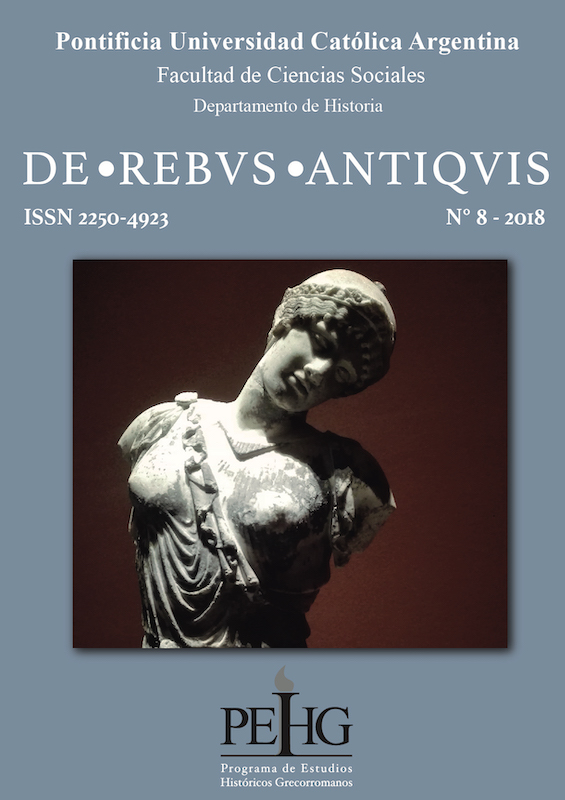Graciano: um imperador em luta contra alamanos e godos (Séc. IV d.C.)
Palabras clave:
Imperador Graciano, Alamanos, Godos, Documentos escritos, MoedasResumen
Em um século IV marcado por ameaças constantes ao poder de império, autores como o senador Quinto Aurélio Símaco, o historiador Amiano Marcelino e o bispo Ambrósio, colocaram suas penas a serviço da identificação dos inimigos bárbaros que assolavam o império de Graciano. Segundo estes discursos, perfídia e falsidade dominavam os godos; a ferocidade, os alamanos. Em Graciano estavam as virtudes necessárias para vencer estes inimigos. Uma moeda cunhada sob Graciano também carregava esta elaboração. Neste artigo, investigo os contrastes gerados entre vícios e virtudes para propagar dicotomias arraigadas àquela sociedade: a selvageria bárbara contra a civilidade romana. Sugiro que tais comparações destacavam a periculosidade dos povos estrangeiros e, em contrapartida, realçavam a utilidade pública imperial.
Descargas
Citas
REFERÊNCIA BIBLIOGRÁFICA:
DOCUMENTOS:
AMBRÓSIO. Sobre la fe.(2009). Introducción, traducción y notas de Secundino García. Madrid: Editorial Ciudad Nueva.
_____________________. De fide: Texto latino disponível em: <http://www.documentacatholicaomnia.eu/02m/0339-0397,_Ambrosius,_De_Fide
_Ad_Gratianum_Augustum_Libri_Quinque,_MLT.pdf> Acesso em: 12/01/2014.
CÍCERO. Filípicas. (1994). Edición, introducción y notas de Pere J. Quetglas. Traducción de Juan Bautista de Calva. Barcelona, Editorial Planeta.(Latín-Español)
GORGULHO, Gilberto da Silva; STORNIOLO, Ivo; ANDERSON, Ana Flora (coords.). (1986). Bíblia de Jerusalém. Edição em língua portuguesa. São Paulo: Edições Paulinas.
SÍMACO EUSÉBIO, Quinto Aurélio. (2003). Informes - Discursos. Introducciones, traducción y notas: Jose Antonio Valdés Gallego. Madrid: Editorial Gredos S.A.
_____________________. Relationes: Q. Aurelli Symmachi V.C. praefecti urbis relationes. In: SEECK, Otto. (1883).Q. Aurelii Symmachi quae supersunt. Berolini: APVP Weidmannos.
AMIANO MARCELINO. (2002). Historia. Edición de Maria Luisa Harto Trujillo. Madrid: Ediciones Akal.
__________________. Res gestae (in three books). (1935). With an english translation by John C. Rolfe. London: William Heinemmann; Cambridge, Massacgusetts: Harvard University. (Latin and English texts).
BIBLIOGRAFIA:
BROWN, Peter. (1992). Power and Persuasion in Late Antiquity: towards a Christian Empire. Madison: The University of Wisconsin.
FRIGHETTO, Renan. (2012). A antiguidade tardia: Roma e as monarquias romano-bárbaras numa época de transformações (Séculos II - VIII). Curitiba: Juruá.
LIEBESCHUETZ, J. H. W. (2002). The end of the Roman army in the western empire. Em: RICH, John; SHIPLEY, Graham (Eds.). War and society in the Roman world. New York, Routledge: 265-276.
MAZZA, Mario. L’intellettuale come ideologo: Flavio Filostrato ed uno “speculum principis” del III secolo d.C. Em: Governanti e Intellettuali Popolo di Roma e Popolo di Dio (I – VI secolo). (1982). Torino, Giappichelli Editore: 93-121.
PEREIRA, Maria Helena da Rocha (s/d) (2009). II Parte: Ideias Morais e Políticas dos Romanos. Em: Estudos de História da Cultura Clássica. vol. II. Cultura Romana. Lisboa, Fundação Calouste Gulbenkian, 319 – 421.
RODRÍGUEZ GERVÁS, Manuel J. (1991). Propaganda política y opinión pública en los panegíricos latinos del bajo Imperio. Salamanca-Espanha: Ediciones Universidad de Salamanca.
RODRÍGUEZ GERVÁS, Manuel J. (2008). La retórica del siglo IV: espacios de integración y exclusión del bárbaro. Studia Historica. Historia Antigua. Salamanca: Ediciones Universidad de Salamanca, n. 26: 149-165.
SHAW, Brent D. (1999). War and Violence. Em: BOWERSOCK, G. W.; BROWN, Peter; GRABAR, Oleg (eds.). Late Antiquity: a guide to the postclassical world. Cambridge, Massachusetts, and London, England, The Belknap Press of Havard University Press.
SILVA, Gilvan Ventura da; MENDES, Norma Musco. (2006). Diocleciano e Constantino: a construção do Dominato. Em: SILVA, Gilvan Ventura da; MENDES, Norma Musco. (orgs.). Repensando o Império Romano: perspectiva sócioeconômica, política e cultural. Rio de Janeiro, Mauad; Vitória, ES, EDUFES, 193-221.
Descargas
Publicado
Cómo citar
Número
Sección
Licencia










